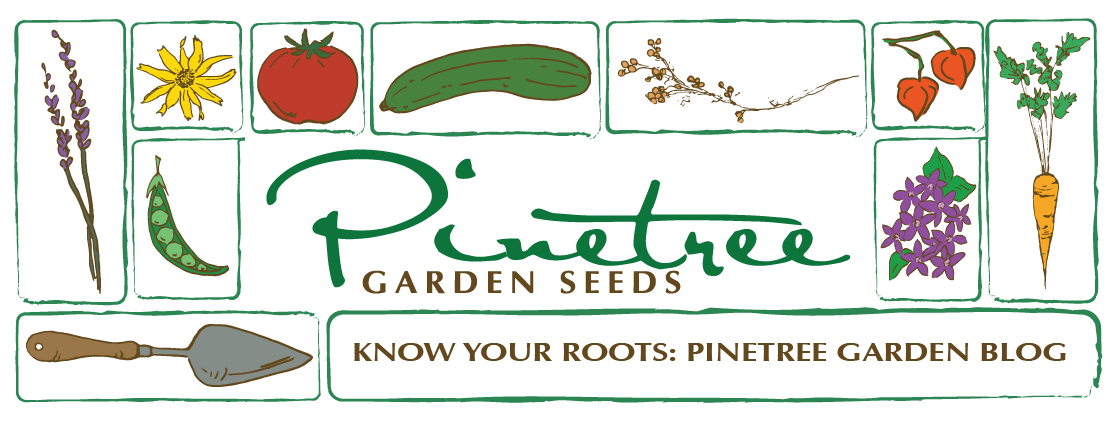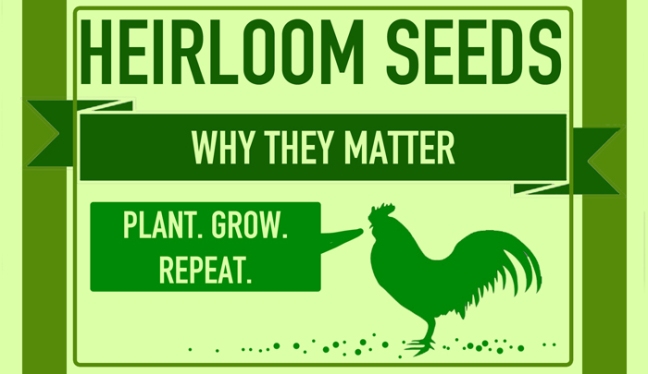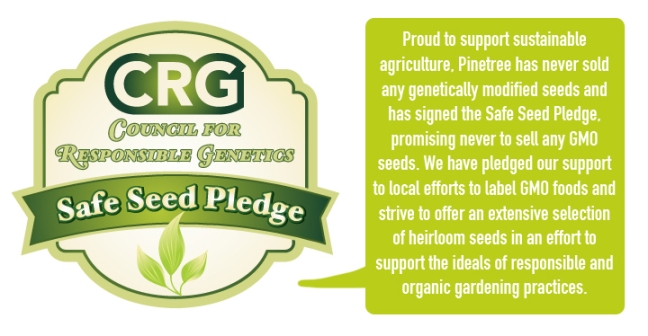Often times when you’re standing in the produce section of the grocery store or farmer’s market, you’ll see something labeled as “Heirloom”. Frequently these items may seem oddly shaped or colored… outside of the normally round, red tomato or long, orange carrot. These unique fruits, flowers and vegetables are from seeds that are called “Heirloom” varieties; seeds that have been passed down for anywhere from 50-100 years… sometimes even for centuries! They are not modified in any way… simply seeds that are planted, harvested at the end of the season and then planted again the next season for as long as you wish to grow them. Even if the first time you plant your heirloom seed it does not grow well or produce well, still save the seed and replant it. You will be amazed by the plant’s natural ability to overcome disease and other growing defects. More often than not, the typical fruits and veggies that you see in the grocery store produce section are “Hybrid” varieties. Heirloom variety fruits and vegetables tend to be much more diverse, with several varieties of colors, flavors and sizes.
Hybrid seeds are most commonly labeled as “F1” hybrid varieties in seed catalogs. Some people liken the hybridizing process to that of breeding a horse with a donkey, creating a mule. Like mules, most F1 varieties are sterile (their seed cannot be planted the next year), one of a kind and are genetically identical. They ripen faster and all at the same time, making them ideal for farmers that sell to grocery stores. Hybrids are also claimed to be a little easier to grow, therefore are friendlier to the beginner gardener. They also offer higher yield, which may be advantageous to the farmer looking to sell at the farmer’s market, or someone interested in canning.
Keep in mind that hybrid plants and genetically modified, or GMO, plants are different from each other, as there is sometimes confusion about how the two relate. Hybrid seeds are from plants that were intentionally bred together, or cross pollinated, with the goal of faster and easier production and harvesting. Genetically modified plants are those that have been altered in their very DNA to create a desired result, such as disease resistance, bigger and better crops and more vibrant color.
Here’s some more information about hybrid vs. GMO seeds as provided by Mother Earth News.
There is a strong belief that genetically modified plants are detrimental to humans, animals and the environment. In order to make these plants disease resistant, scientists go as far as directly injecting pesticides into the DNA of the very food that we consume. There have also been suggested cases of tomatoes being injected with frog DNA in order to make them more resistant to cold. While some believe this all to be good advances toward making crops more productive and solving hunger crises… when does the cost become too high? At the very least, we should be more aware of that which we consume, and perhaps become more reliant on our own resources to supply our own food. As cited on the Mother Earth News website, “Some sources conservatively estimate that 60 percent or more of processed foods available in the United States contain GM ingredients, because most processed foods contain corn or soy.”
The fight in North America to get all foods containing genetically modified material labeled has been ongoing for over eighteen years now. Some countries such as Australia require that all GMO foods be labeled, and countries such as Japan, Ireland, and Egypt have banned GMO foods completely. In the US, it has been decided by the FDA that GMO foods are not substantially different enough to be labeled, therefore go on being unapologetically inserted into every American’s daily life without consent.
For more information about GMOs and how they affect us, check out this article on Mother Earth News. Click here to read about our stance on GMOs (scroll down to the table of contents and click “Our Stance on GMOs”).
Be sure to always try to buy your seeds from companies who have taken the “Safe Seed Pledge”, which means the company has dedicated itself to never selling GMO seeds.
Heirloom plants are generally more appealing to the dedicated home gardener. Slower growth and production than a hybrid, but better flavor and quality to be harvested and enjoyed over time. These plants are considered to be “open pollinated”, which is where the flowers of the plants are naturally pollinated by the wind or insects. In general, when saving the seed from an heirloom plant, upon planting them the next season you will produce a plant that is very similar or nearly identical to the plant from the previous year. Keep in mind that if you decide to grow plants from hybrid seed, you will not be able to harvest the seed and use it again the next year, as most hybrid plants end up being sterile.
For more information about how to avoid GMOs and fight against them, please check out the links below.
Non-GMO Project
Say No To GMOs!
Safe Seed Resource List
Comprehensive List of Heirloom Variety Vegetables by Mother Earth News





Been buying all our garden seeds from you for years. Very disappointed to see you hopping on the non-GMO bandwagon.
With all due respect, we have never sold GMO seeds, and never will, so this is simply an additional public statement to those we have already made. If you have been on our website, you will see that we have been firmly against GMO seeds for many years.
I was just referred to your company a few days ago, so I missed out on ordering my seeds from you (I ordered from another Non-GMO, heirloom company instead.) I don’t consider a refusal to sell GMO poison “jumping on the bandwagon.” I liken that statement to someone being accused of quitting smoking “jumping on the quitting band wagon.” Preposterous! I applaud your company for staying traditional, healthy and organic. Thank you!
I love that you are “hopping on the non-GMO bandwagon. Have many health issues with children and grandchildren. Have been buying your seeds and love them. I have a small greenhouse and garden and they are very productive. Keep up the good work. Than k you for caring.
Thank you Karen!
Hopping on the Non-GMO bandwagon? How absurd. These folks have never sold GMO seeds. They believed in sticking to natural practices long before it was “cool.”
🙂
Thank you for the information. Could you kindly inform me whether you are able to ship the seeds Turkey or not ?